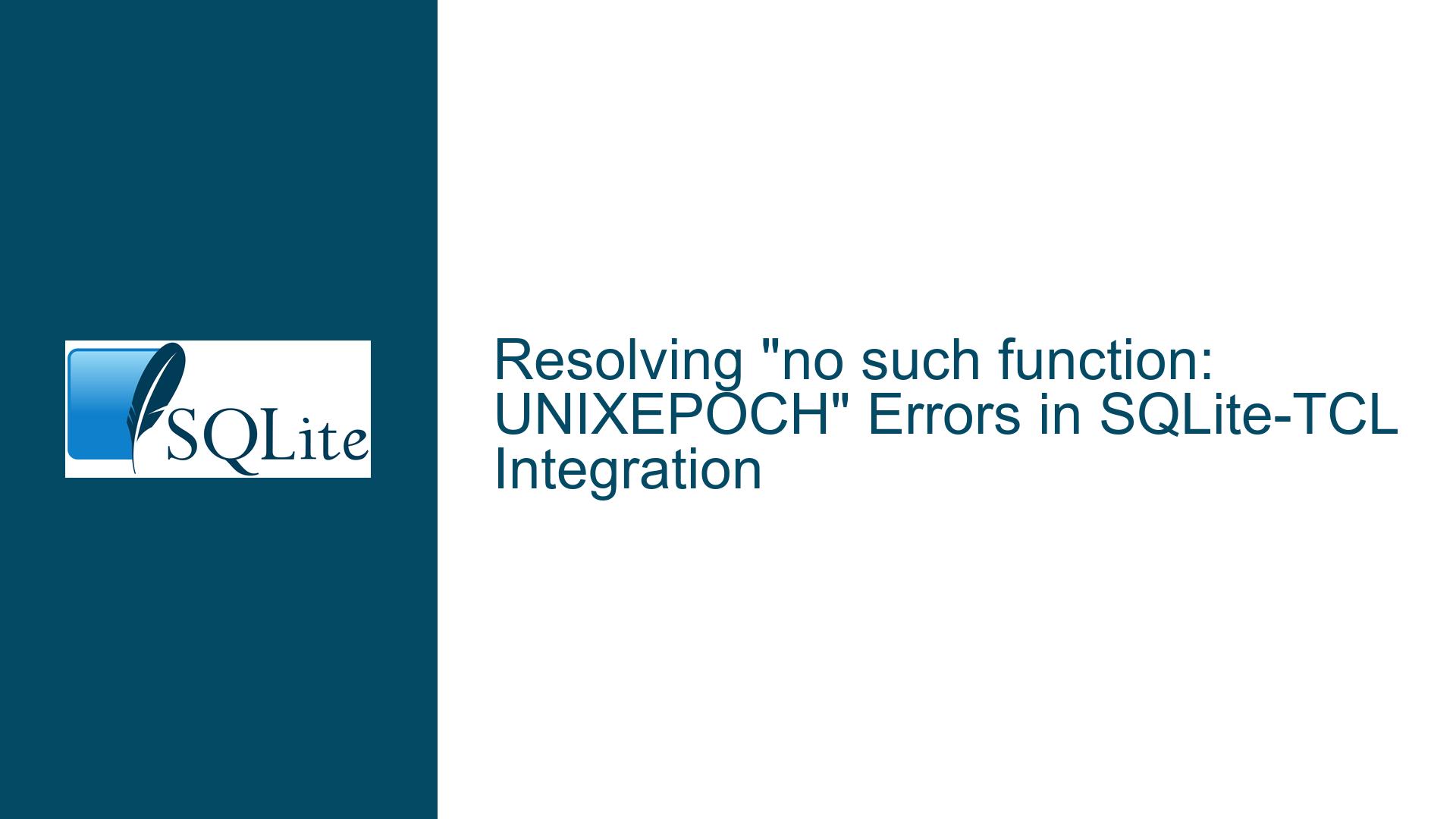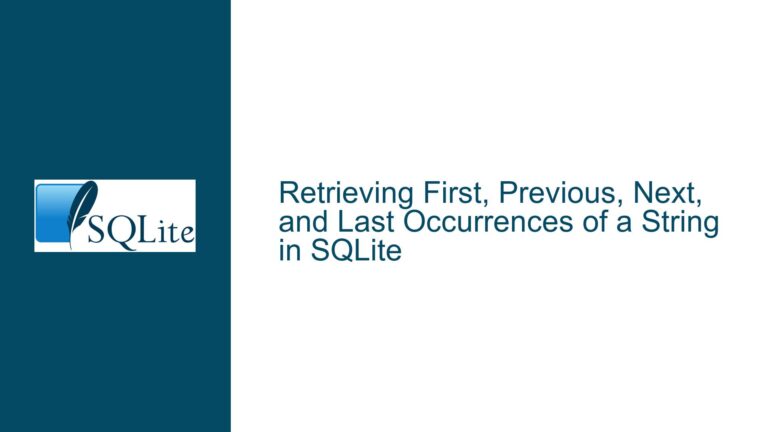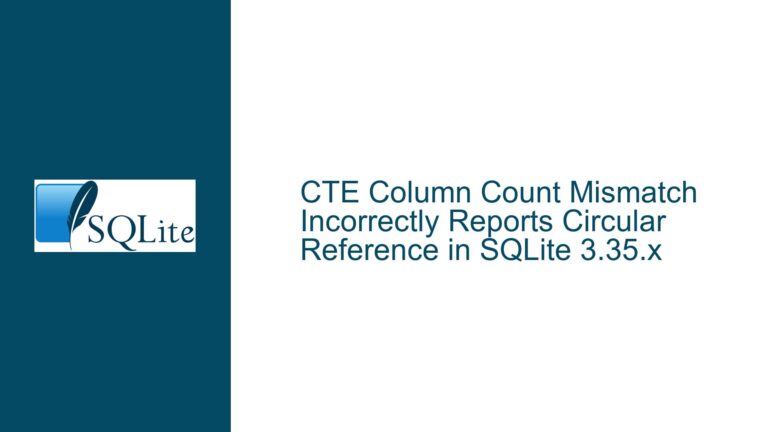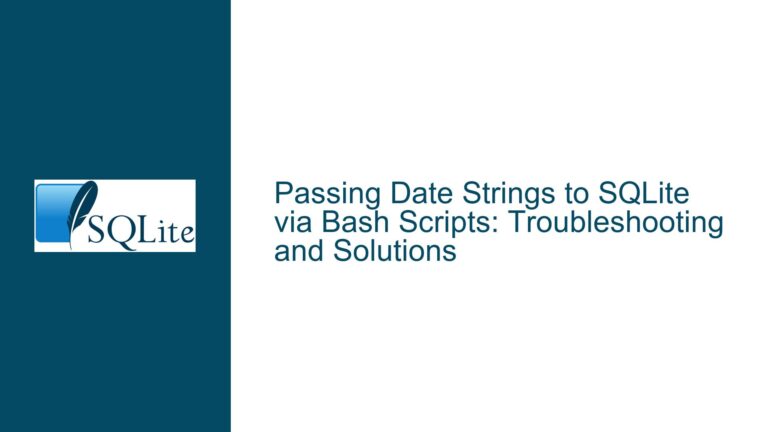Resolving “no such function: UNIXEPOCH” Errors in SQLite-TCL Integration
SQLite Function Availability Discrepancies Between TCL Bindings and CLI
Core Issue: Mismatched SQLite Library Versions Between TCL Bindings and System Installation
The error "no such function: UNIXEPOCH" arises when a SQLite database connection made via TCL’s sqlite3 package attempts to use the UNIXEPOCH() function but cannot locate it. This occurs specifically because the SQLite library linked to the TCL bindings is older than version 3.38.0, which first introduced UNIXEPOCH(). The system’s standalone sqlite3 CLI tool may report a newer version (e.g., 3.38.5), while the TCL bindings use an older library (e.g., 3.35.4). This version disparity creates an environment where the same SQL query works in the CLI but fails in TCL due to missing function definitions.
The UNIXEPOCH() function, added in SQLite 3.38.0 (2022-02-22), calculates Unix timestamps. Older SQLite versions lack this function but support similar time/date operations via strftime('%s',...). The TCL sqlite3 package dynamically links to a SQLite shared library at runtime. If the bindings were compiled against or linked to an older SQLite version, they inherit its function definitions, even if a newer SQLite CLI is installed elsewhere. This discrepancy often stems from outdated dependencies in language-specific packages, conflicting installation paths, or environment-specific library loading priorities.
Diagnosing Version Conflicts in Embedded SQLite Environments
Three primary factors contribute to this error:
- Outdated TCL-SQLite Bindings: The TCL
sqlite3package might ship with a bundled SQLite library or link to a system-wide installation that predates 3.38.0. Package managers often lag behind upstream SQLite releases, especially in stable/LTS distributions. - Dynamic Library Path Misconfiguration: Even with a newer SQLite CLI installed, the TCL bindings might load an older shared library (e.g.,
/usr/lib/libsqlite3.so.0.8.6) due toLD_LIBRARY_PATHsettings or linker cache mismatches. - Static Linking in TCL Bindings: Some precompiled TCL packages statically link SQLite, freezing the library version regardless of system updates. This is common in language-specific packages prioritizing stability over bleeding-edge features.
A critical detail is that the SQLite CLI and TCL bindings operate as separate processes with independent library dependencies. The CLI’s version is irrelevant to TCL’s bindings unless they explicitly share the same dynamic library. Developers often overlook this distinction, assuming that updating the CLI updates all integrations.
Resolving Version Mismatches and Enabling UNIXEPOCH() in TCL
Step 1: Verify SQLite Versions in Both Environments
Execute sqlite3 --version in the terminal to confirm the CLI version. In TCL, run:
package require sqlite3
puts [db version]
If the TCL-reported version is below 3.38.0, the bindings use an outdated SQLite library.
Step 2: Identify the Loaded SQLite Library in TCL
On Unix-like systems, use ldd or objdump to trace the TCL bindings’ library dependencies:
ldd /path/to/tcl/sqlite3.so | grep sqlite3
This reveals the shared library path (e.g., /lib/x86_64-linux-gnu/libsqlite3.so.0.8.6). Compare its version with the CLI’s using:
sqlite3 --version
/usr/lib/sqlite3/libsqlite3.so.0.8.6 --version
If mismatched, proceed to align the libraries.
Step 3: Update or Rebuild TCL-SQLite Bindings
Option A: Install Updated Bindings
Use a package manager to upgrade the TCL-SQLite package. For example, on Debian/Ubuntu:sudo apt-get install tcl-sqlite3If the repository version is outdated, compile from source:
git clone https://github.com/sqlite/sqlite cd sqlite ./configure --enable-tcl --with-tcl=/usr/lib/tcl8.6 make sudo make installThis compiles SQLite with TCL bindings, ensuring they use the same updated library.
Option B: Force TCL to Use a Newer Shared Library
Set theLD_LIBRARY_PATHto prioritize the directory containing the newer SQLite shared library:export LD_LIBRARY_PATH=/path/to/new-sqlite/lib:$LD_LIBRARY_PATH tclsh8.6 your_script.tclThis temporarily redirects dynamic linking without reinstalling packages.
Step 4: Fallback to strftime(‘%s’, ‘now’) for Backward Compatibility
If updating isn’t feasible, replace UNIXEPOCH() with:
SELECT strftime('%s', 'now');
This alternative works in SQLite versions ≥3.7.16 (2013-03-18). For subsecond precision, use:
SELECT (strftime('%s', 'now') + substr(strftime('%f', 'now'), 4)) AS unixepoch;
Step 5: Validate Function Availability Programmatically
In TCL, check for UNIXEPOCH() support before using it:
if {[catch {db eval {SELECT UNIXEPOCH();}}]} {
# Fallback to strftime
}
This gracefully handles environments where the function is missing.
Step 6: Recompile TCL Bindings Against Updated SQLite Sources
If precompiled packages are outdated, manually build the TCL bindings against SQLite 3.38.0+:
wget https://sqlite.org/2022/sqlite-autoconf-3390000.tar.gz
tar xvfz sqlite-autoconf-3390000.tar.gz
cd sqlite-autoconf-3390000
./configure --enable-tcl --with-tcl=/usr/lib/tcl8.6
make
sudo make install
This ensures the TCL bindings and CLI share the same modern SQLite engine.
Final Validation
After updates, rerun the TCL script. The UNIXEPOCH() function should execute without errors. Confirm with:
db eval {SELECT sqlite_version(), UNIXEPOCH();}
This returns both the SQLite version and the current Unix timestamp, verifying compatibility.
By systematically addressing version mismatches, developers ensure consistent SQLite function availability across all integration points, eliminating "no such function" errors and enabling reliable use of modern features like UNIXEPOCH().






